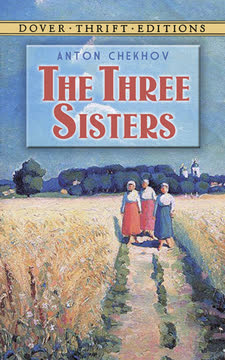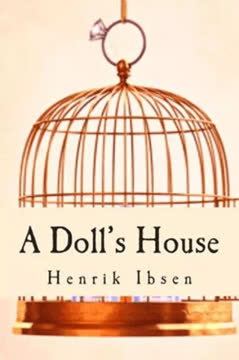Plot Summary
Yearning for Moscow's Light
In a provincial Russian town, the Prosorov sisters—Olga, Masha, and Irina—mark the anniversary of their father's death. Their hearts ache for Moscow, the city of their childhood, which represents hope, culture, and a life of meaning. The sisters, each at a crossroads, feel trapped by the monotony and smallness of their current existence. Their brother Andrey, once full of promise, now seems as lost as they are. The sisters' longing for Moscow is not just nostalgia but a symbol of their desire for fulfillment, love, and purpose. As they reminisce and tease each other, the sense of being stuck—of life passing them by—settles over the household, setting the tone for the struggles to come.
A Family in Stagnation
The sisters' daily lives are marked by repetition and disappointment. Olga, the eldest, is worn down by her teaching job; Masha, married young to a dull schoolteacher, is restless and disillusioned; Irina, the youngest, is still hopeful but increasingly frustrated by the lack of meaningful work. Andrey, their brother, aspires to be a professor but is already showing signs of resignation. The family's conversations circle around their dreams and regrets, with each member feeling the weight of unfulfilled potential. The house, once lively, now feels like a cage, and the sisters' shared yearning for change only deepens their sense of inertia.
New Faces, Old Longings
The arrival of Lieutenant-Colonel Vershinin, a fellow Muscovite, brings a breath of fresh air and philosophical conversation. His presence rekindles the sisters' dreams and stirs Masha's heart. Baron Tuzenbach, a kind but awkward officer, quietly loves Irina, while Captain Soloni's brooding presence hints at future trouble. The sisters are drawn to these outsiders, who seem to offer a connection to the world beyond their provincial town. Yet, even as new relationships form, the old longing for Moscow and a better life remains unfulfilled, and the sisters' hopes are tinged with melancholy.
Natasha's Quiet Ascendancy
Andrey's fiancée, Natasha, initially shy and awkward, gradually asserts control over the Prosorov home. Her practical concerns—her children's health, household order—clash with the sisters' more idealistic and nostalgic outlook. Natasha's influence grows as she manipulates Andrey and subtly pushes the sisters aside, even taking over their rooms for her children. Her rise is quiet but relentless, symbolizing the encroachment of mediocrity and the loss of the family's former spirit. The sisters, powerless to resist, watch as their home and dreams are slowly overtaken.
The Weight of Work
Irina, desperate for purpose, takes a job at the telegraph office, but the work is dull and soul-crushing. Olga is promoted to headmistress, a position she never wanted, and Masha's marriage grows colder. The sisters' belief that work would give their lives meaning is tested and found wanting. Instead of liberation, they find exhaustion and disappointment. The gap between their ideals and reality widens, and their conversations turn increasingly to the futility of their efforts. The hope that Moscow—or any change—will save them begins to fade.
Love's Unspoken Confessions
Masha falls in love with Vershinin, finding in him a kindred spirit and a brief escape from her unhappy marriage. Irina is courted by both Tuzenbach and Soloni, but she cannot return their affections, her heart still waiting for a love she has only imagined. Andrey, meanwhile, is drawn deeper into Natasha's orbit, losing himself in work and gambling. The sisters confide in each other, sharing their pain and longing, but their confessions bring little relief. Love, in their world, is complicated, unfulfilled, and often a source of suffering rather than joy.
The Fire and Its Shadows
A devastating fire sweeps through the town, forcing the sisters and their neighbors to confront loss and chaos. The event brings the community together briefly, but also exposes the fragility of their lives. The sisters give away their possessions to help the victims, but the fire also accelerates the changes in their household. Natasha seizes the moment to further displace the sisters and assert her authority. The fire becomes a metaphor for the destruction of old hopes and the relentless advance of time and change.
Dreams Mortgaged Away
Andrey, once the family's great hope, has mortgaged the house to pay his debts, effectively surrendering the family's future to Natasha and her ambitions. The sisters are devastated by this betrayal, realizing that their last connection to their past and to Moscow is slipping away. Andrey's decline mirrors the family's overall sense of defeat. The sisters' dreams, already battered, are now financially and emotionally compromised. The realization that they are truly trapped in their provincial life settles in, and the mood grows increasingly somber.
The Army's Farewell
The military battery, including Vershinin and Tuzenbach, receives orders to leave the town. Their departure marks the end of the sisters' last connection to the outside world and to their dreams of escape. Farewells are bittersweet, filled with promises to write and memories of happier times. The sisters, especially Masha and Irina, are left to face the emptiness of their lives without the distraction of their friends and admirers. The sense of loss is palpable, and the future seems more uncertain than ever.
Duels and Departures
Tensions between Tuzenbach and Soloni, both in love with Irina, culminate in a fatal duel. Tuzenbach, on the eve of his marriage to Irina, is killed, shattering her last hope for a new beginning. The duel, senseless and rooted in wounded pride, underscores the futility and destructiveness of the characters' passions. The sisters are left to mourn not only Tuzenbach but also the loss of possibility and the finality of their provincial fate. The violence is abrupt, but its emotional impact lingers, deepening the play's sense of tragedy.
The End of Illusions
With Tuzenbach dead and the army gone, the sisters are forced to confront the reality of their situation. Masha's affair with Vershinin ends as he leaves with his regiment, and she returns to her husband, resigned but changed. Olga, now headmistress, takes on the role of caretaker for her sisters and the remnants of their family. Irina, devastated but determined, resolves to dedicate herself to work and service. The sisters' illusions about love, escape, and fulfillment are stripped away, leaving only the bare facts of their existence.
Sisters in the Garden
In the garden, the three sisters gather for a last time before Irina's departure. They cling to each other, seeking comfort and meaning in their shared suffering. The music of the departing soldiers drifts through the air, mingling with their memories and regrets. Despite everything, the sisters reaffirm their bond and their commitment to endure. Their unity, though fragile, is a source of strength as they face an uncertain future. The garden, once a place of hope, now becomes a space for reflection and quiet resilience.
Natasha's New Order
With the sisters' influence waning, Natasha takes full control of the household. She plans to remodel the garden, rearrange the rooms, and raise her children according to her own values. Her practical, self-serving approach stands in stark contrast to the sisters' idealism. Natasha's rise is complete, and the old order of the Prosorov family is effectively erased. The sisters, now outsiders in their own home, must accept the new reality. Natasha's triumph is both mundane and chilling, a testament to the slow, inevitable victory of the ordinary over the extraordinary.
The Baron's Last Morning
On the morning of his duel, Tuzenbach is filled with a mix of hope and dread. He confesses his love to Irina, who, though grateful, cannot reciprocate his feelings. The impending duel with Soloni hangs over him, a senseless act driven by jealousy and pride. Tuzenbach's death is both tragic and pointless, a final blow to Irina's dreams and a symbol of the randomness of fate. His quiet courage and unrequited love leave a lasting impression on the sisters, especially Irina, who must now find a way to move forward.
Masha's Bitter Goodbye
As Vershinin departs with the army, Masha is left to grapple with the end of their affair and the return to her unsatisfying marriage. Her grief is raw and unfiltered, a mix of regret, longing, and resignation. Kuligin, her husband, offers forgiveness and understanding, but Masha's pain cannot be easily soothed. The loss of Vershinin marks the end of Masha's last hope for passion and meaning. Her farewell is both personal and emblematic of the broader losses suffered by all the sisters.
The Music of Survival
The sounds of music and daily life persist even as the sisters mourn their losses. The town returns to its routines, and the sisters must find ways to endure. Olga, now the family's anchor, encourages her sisters to keep living and working, despite their pain. The music, both literal and metaphorical, represents the resilience of the human spirit in the face of suffering. The sisters' ability to survive, if not thrive, becomes a quiet act of defiance against the forces that have diminished their lives.
The Unanswered Why
The sisters reflect on the purpose of their struggles and the possibility of future happiness. They wonder if their pain will one day be understood or justified, if their sacrifices will contribute to a better world. The question of "why" remains unanswered, but the sisters find solace in the hope that their lives, though difficult, are not entirely in vain. Their endurance becomes a form of meaning in itself, a testament to the possibility of hope even in the absence of clear answers.
The Promise of Tomorrow
As the play ends, the sisters stand together, looking toward an uncertain future. Their dreams of Moscow remain unfulfilled, but they resolve to keep living, working, and hoping. The music of the departing soldiers fades, but the sisters' bond persists. They believe that, someday, their suffering will give way to happiness for others, if not for themselves. The promise of tomorrow, though faint, sustains them as they face the challenges ahead. Their story closes not with triumph, but with the quiet dignity of endurance.
Characters
Olga Prosorov
Olga is the oldest of the Prosorov siblings, a schoolteacher whose sense of duty and responsibility weighs heavily on her. She is nurturing and self-sacrificing, often putting her sisters' needs before her own. Olga's longing for Moscow is tied to her memories of a happier, more vibrant life. As the family's fortunes decline, she becomes the de facto head of the household, especially after being promoted to headmistress. Olga's psychological struggle is with exhaustion and resignation; she yearns for escape but ultimately accepts her role as caretaker. Her development is marked by a gradual acceptance of reality and a quiet strength that holds the family together.
Masha Prosorov
Masha, the middle sister, is intelligent, sensitive, and deeply dissatisfied with her life. Married young to Kuligin, a well-meaning but uninspiring schoolteacher, she finds herself trapped in a loveless marriage. Masha's affair with Vershinin offers her a brief respite from her unhappiness, but it also brings guilt and heartbreak. She is prone to mood swings, sarcasm, and moments of intense emotion. Masha's psychological journey is one of longing for meaning and connection, only to be confronted by the limitations of her circumstances. Her ultimate return to her husband is an act of resignation, but also of survival.
Irina Prosorov
Irina begins the play full of hope and dreams of a meaningful life in Moscow. She believes in the value of work and the possibility of love, but her experiences gradually erode her optimism. Irina is courted by Tuzenbach and Soloni, but cannot reciprocate their feelings, her heart set on an ideal she cannot find. The death of Tuzenbach and the loss of her dreams force Irina to confront the harshness of reality. Her psychological arc moves from hope to despair, and finally to a stoic acceptance of her fate. She resolves to dedicate herself to work, finding purpose in service to others.
Andrey Prosorov
Andrey is the only brother, once seen as the family's great hope. He aspires to be a professor but is gradually worn down by disappointment, debt, and his marriage to Natasha. Andrey's passivity and inability to assert himself lead to the family's decline, as he mortgages the house and allows Natasha to take control. Psychologically, Andrey is marked by self-doubt, escapism, and a sense of failure. His relationship with his sisters deteriorates as he becomes more isolated and resigned to his fate. Andrey's arc is a cautionary tale of wasted potential and the dangers of inaction.
Natasha (Natalia Ivanovna)
Natasha enters the family as Andrey's shy fiancée but quickly becomes the dominant force in the household. She is practical, self-serving, and unencumbered by the sisters' ideals or nostalgia. Natasha's rise is marked by her ability to manipulate Andrey and assert control over the home, eventually displacing the sisters. Her psychological makeup is pragmatic and unsentimental; she values order and security over dreams. Natasha's development is a study in the quiet, relentless power of the ordinary, and her triumph represents the victory of practicality over idealism.
Alexander Vershinin
Vershinin is a lieutenant-colonel who brings new ideas and energy to the Prosorov household. He shares the sisters' longing for a better future and engages them in philosophical discussions about happiness and progress. Vershinin's affair with Masha is both passionate and doomed, offering a glimpse of what might have been. Psychologically, he is an optimist, believing in the eventual improvement of humanity, but he is also trapped by his own unhappy marriage. Vershinin's presence catalyzes change in the sisters, but his departure marks the end of their last hopes for transformation.
Baron Tuzenbach
Tuzenbach is a kind-hearted officer who loves Irina with quiet devotion. He believes in the value of work and dreams of building a new life with her. Despite his lack of charisma, Tuzenbach's sincerity and resilience make him a sympathetic figure. His rivalry with Soloni and his ultimate death in a duel highlight the senselessness of violence and the fragility of hope. Psychologically, Tuzenbach is marked by perseverance and a willingness to sacrifice for others. His tragic end underscores the play's themes of unfulfilled dreams and the randomness of fate.
Captain Soloni
Soloni is a captain in the army, socially awkward and prone to dark, romantic obsessions. He is in love with Irina and resents Tuzenbach, leading to the fatal duel. Soloni's psychological profile is one of alienation, jealousy, and a tendency toward violence. He is both pitiable and dangerous, representing the destructive potential of unrequited love and wounded pride. Soloni's actions serve as a catalyst for tragedy, and his inability to connect with others highlights the play's themes of isolation and misunderstanding.
Feodor Kuligin
Kuligin is Masha's husband, a high school teacher who is earnest, kind, and somewhat oblivious to his wife's unhappiness. He represents the safe, conventional life that the sisters find stifling. Kuligin's psychological makeup is marked by contentment with routine and a lack of ambition. He loves Masha sincerely and forgives her infidelity, embodying a kind of quiet endurance. Kuligin's presence in the play serves as a contrast to the sisters' longing for something more, highlighting the tension between comfort and aspiration.
Ivan Chebutikin
Chebutikin is an old family friend and army doctor who has lost faith in his profession and in life itself. He is affectionate toward the sisters, especially Irina, but is haunted by regret and a sense of futility. Chebutikin's psychological state is one of resignation and detachment; he often repeats that "it's all the same," reflecting his belief in the meaninglessness of existence. His moments of drunkenness and confession reveal a deep well of pain and disappointment. Chebutikin's character embodies the play's existential themes and the struggle to find meaning in a world that often seems indifferent.
Plot Devices
The Unattainable Moscow
Throughout the play, Moscow represents the sisters' idealized past and their hope for a better future. The city is invoked repeatedly as a place of culture, happiness, and fulfillment, in stark contrast to their provincial reality. This unattainable goal serves as both a motivator and a source of pain, highlighting the gap between aspiration and reality. The motif of Moscow structures the narrative, providing a through-line for the sisters' emotional journeys and underscoring the play's themes of longing and disappointment.
Cyclical Structure and Repetition
The play's structure mirrors the repetitive nature of the sisters' lives, with scenes of daily routine, recurring conversations, and repeated expressions of longing. This cyclical pattern emphasizes the difficulty of change and the endurance required to survive disappointment. The repetition of motifs—such as the music, the refrain of "to Moscow," and the sisters' confessions—creates a sense of stasis, while also highlighting the persistence of hope in the face of adversity.
Foreshadowing and Symbolism
Chekhov employs foreshadowing through dialogue and symbolic events, such as the fire, the breaking of the clock, and the references to duels and departures. These moments signal impending loss and the inevitability of change. The fire, in particular, serves as a metaphor for destruction and renewal, while the duel represents the senselessness of violence and the fragility of hope. Symbolic objects, like the clock and the garden, reinforce the play's themes of time, memory, and the passage from one era to another.
Ensemble Cast and Interwoven Relationships
The play's large cast and interlocking relationships allow for a rich exploration of its central themes. Each character's story intersects with the others, creating a tapestry of longing, disappointment, and resilience. The ensemble structure enables Chekhov to present a range of responses to adversity, from Natasha's pragmatism to the sisters' idealism, and from Andrey's passivity to Chebutikin's despair. This multiplicity of voices deepens the play's psychological complexity and emotional impact.
Analysis
Chekhov's The Three Sisters is a masterful exploration of the human condition, capturing the ache of unfulfilled dreams and the quiet heroism of survival. The sisters' yearning for Moscow is less about geography than about the universal desire for meaning, love, and self-actualization. The play's genius lies in its refusal to offer easy answers or dramatic resolutions; instead, it presents life as a series of small disappointments and fleeting joys, where hope persists even in the face of relentless mediocrity. Natasha's rise and the sisters' decline reflect the slow erosion of ideals by the forces of practicality and routine. Yet, Chekhov's compassion for his characters shines through: their suffering is not meaningless, but part of a larger, ongoing human story. In a modern context, the play resonates as a portrait of existential anxiety, the search for purpose, and the resilience required to keep living when dreams fade. Its lesson is not one of triumph, but of dignity in endurance and the possibility that, through work and connection, tomorrow may yet bring meaning.
Last updated:
Review Summary
The Three Sisters depicts the lives of three Russian sisters longing to return to Moscow. Reviews are mixed, with some praising its philosophical depth and existential themes, while others find it boring. Critics appreciate Chekhov's portrayal of human nature, unfulfilled dreams, and the inability to act. The play's subtle humor and poignant dialogue resonate with many readers. Some reviewers note the play's relevance to modern life, while others struggle to connect with the characters. Overall, it's considered a significant work in Russian literature, though opinions on its entertainment value vary.
Download PDF
Download EPUB
.epub digital book format is ideal for reading ebooks on phones, tablets, and e-readers.










